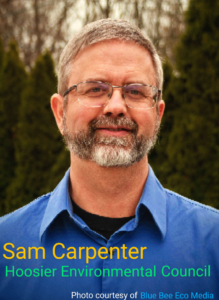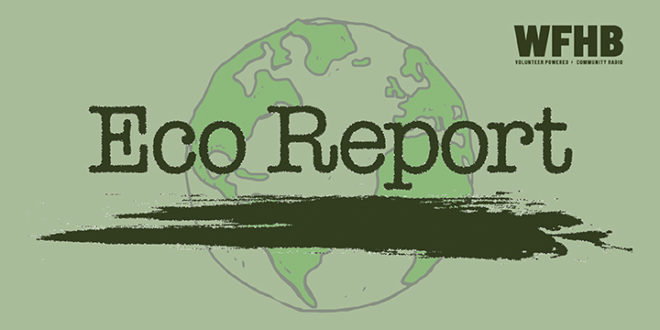Podcast: Play in new window | Download (Duration: 30:21 — 41.7MB)
Subscribe: RSS
You’re listening to Eco Report. In today’s feature, Environmental Correspondent Zyro Roze brings us Part Two of his discussion with Sam Carpenter on bills opposed and backed by the Hoosier Environmental Council in the 2024 Legislative Session.

The olive tree, according to Greek mythology, was created by Athena, the goddess of wisdom, as a gift to the people of her namesake city, Athens. Olives and olive oil have become synonymous with Greece, and are credited, in part, with fueling the rise of Greek civilization. But despite a history spanning thousands of years, these culinary pillars of Greek identity are under threat. Small farmers expect this year’s harvest season, which got underway in November, to be one of the worst years on record, thanks to climate change and the irregular seasonal shifts it has wrought upon the flowering process and fruit development.
We are collecting olives much earlier than ever before. Our producers do not recall any year like this,” says Michael Antonopoulos, president of the Agricultural Cooperative of Kalamata. I think we will see less and less olive trees not only in our region, but all the Mediterranean, because the Africa heat line is moving forward to Europe. Greek growers are having to patrol their trees during harvest because of high levels of poaching. Spain has been blighted by a long-running drought, caused by record-high temperatures in 2022 and 2023 and almost three years of reduced rainfall. Throughout the country, reservoirs have been depleted; in the worst-affected areas, they are at less than 20 percent of their capacity.
The Mediterranean basin, responsible for about 95 percent of global olive oil production, was particularly impacted by both record heat and extreme weather events, with temperatures in Italy reaching 48.2°C, and record-high temperatures reported in Tunisia (49.0°C), Morocco (50.4°C) and Algeria (49.2°C). Furthermore, torrential rainfall resulted in flooding and damage to olive groves in Greece, Turkey and Libya, which also suffered a heavy loss of life. This year’s record temperatures may also impact olive oil production in the 2024/25 crop year, with glaciers in the European Alps experiencing an extreme melt from which they are unlikely to recover in the winter.
Melting snowpack from the Alps in the spring is one of the sources of water upon which northern Italian and French olive growers rely, especially as spring seasons become hotter and drier. The US produces less than 1% of the world’s olives. The major producer is Spain, followed by Italy and Greece. California is the only important olive growing state in the US. California olive production is mostly in the San Joaquin and Sacramento valleys, although some acreage is reported throughout California. All agree we cannot return to the climate of the 20th century, but we must act now to limit the risks of an increasingly inhospitable climate in this and the coming centuries.
Roundup, the most popular and profitable weed killer ever sold, uses glyphosate as its most active ingredient. Glyphosate is toxic to most broadleaf plants and grasses. It kills most plants it comes into contact with, instead of targeting certain weeds or plants. Monsanto, a now defunct company, developed the product. Because glyphosate kills anything it touches, Monsanto developed plant seeds that were genetically modified to resist the damage of Roundup. This is when residential Roundup sales skyrocketed. However, as the years went on, science questioned the safety of glyphosate.
Studies have shown that the chemical might cause illness to humans and cause damage to the environment. The International Agency for Research on Cancer categorizes glyphosate as possibly carcinogenic to humans —essentially, the IARC is saying this toxin may cause cancer. In 2018, Roundup was purchased by Bayer. By then, consumers had filed thousands of lawsuits linking Roundup to cancer. The most common cancer associated with Roundup is non-Hodgkin’s lymphoma. Bayer committed to begin in 2023 replacing “its glyphosate-based products in the U.S. residential Lawn & Garden market with new formulations that rely on alternative active ingredients.”
Given the extreme cold this past January, we checked to see if wind turbines are working. International design standards actually require that wind turbines can work at temperatures down to -4° Fahrenheit. Turbines engineered for cold climates—using technologies like cold-resistant steel and heaters to warm them—can work at temperatures down to -22° Fahrenheit. Below that there is some danger of blades becoming brittle and shattering. Even in a place like Alberta, Canada the turbines operate most of the time during the winter.
It’s a miracle! Paoli Peaks is celebrating 45 years in business. At the beginning, a fair amount of natural snowfall brought in skiers. At the beginning, natural snowfall in that zip code was around 25 inches. Now that area receives an average of 12 inches. The opening date for skiing has depended on the snow-gods and has varied widely. Early on, the closing date was late March; now nearly every year shows a closing a few days earlier. Now closing is more likely mid-February.
One thing is certain: there will come a year not far in the future when there is no skiing at Paoli. The global temperature is guaranteed to rise another 3 – 5 F because our country is exporting more fossil fuel than ever. Other countries, such as China, continue to build coal-fired power plants at a furious pace. Enjoy it when you can, because soon there will be only water skiing around Paoli.

And now, Part Two of Environmental Considerations in the current Legislative Session at the State Capitol with Zyro Roze and the Hoosier Environmental Council’s Sam Carpenter. The full four-part interview will be available online after the show as an Eco Report EXTRA, to be found at WFHB.org.

- Take the Donaldson Cave Hike at Spring Mill State Park on Saturday, February 10th, from 2 to 3 pm. Meet at the Donaldson Cave parking lot. Discover more interesting facts about George Donaldson, an eccentric Scotsman and his contributions to Spring Mill State Park.
- The Whooper Wednesdays will continue at Goose Pond Fish and Wildlife Area until February 21st. Come to the Visitors Center on Wednesday, February 14th, at 9 am to walk the property and see if you can spot some of the resident birds, including the endangered Whooping Crane. Make sure to dress for the weather.
- Take a Tea Blending for Winter Wellness class at the Allison-Jukebox Community Center on Thursday, February 15th, from 6 to 8 pm. Learn to blend your own herbal tea to help support your immune system.
- Learn how to identify trees in the winter during a Buds & Barks Winter Tree ID Hike at Olcott Park in Bloomington on Saturday, February 17th, from 2 to 4 pm. You will be outside taking a close look at the bark, branches and buds to seek out the tree identification. Dress for the weather.
- The Brown County State Park Winter Hike Series continues with a Ten O’Clock Line Nature Preserve Hike on Saturday, February 17th, from 10 am to Noon. This is a 2.5 mile, moderate hike along a fire trail and horse trail. The Ten O’Clock Line Nature Preserve is the largest nature preserve in the state and has a very unique story. Please dress for the weather.
Credits:
This week’s headlines were written by Norm Holy.
Today’s news feature was produced Zyro Roze and edited by Kade Young.
Julianna Dailey assembled the script which was edited by the EcoReport team.
Julianna Dailey compiled our events calendar.
Kade Young and Noelle Herhusky-Schneider produced today’s show.
Branden Blewett is our engineer.
Anchors are Julianna Dailey and Cynthia Roberts.
Thank you for listening and have a wonderful Valentine’s Day!
 WFHB Bloomington Community Radio
WFHB Bloomington Community Radio


